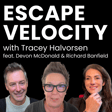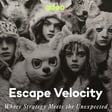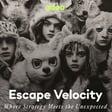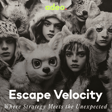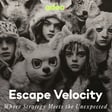
Richard Banfield - The Art of Being Human
In this deeply personal and philosophical conversation, Tracey Halvorsen is joined by Richard Banfield—artist, writer, former CEO, widower, parent, and all-around human compass—for a wide-ranging discussion about identity, agency, grief, creativity, and what it means to truly be present in our lives.
From confronting midlife reinvention and letting go of society’s need to label and define, to embracing vulnerability and the healing power of art, Richard offers an honest and expansive take on what it means to be a whole human navigating an increasingly complex world. The two discuss the myth of productivity, the seductive danger of perfectionism, and how shame can quietly shape our creative pursuits.
They also explore the creative tension between mastery and curiosity, the liberating power of saying “yes,” and how emerging technologies like AI might paradoxically help us reconnect to our humanity. Richard reminds us that our greatest agency lies not in having all the answers, but in showing up—open-hearted and willing—to our own lives.

